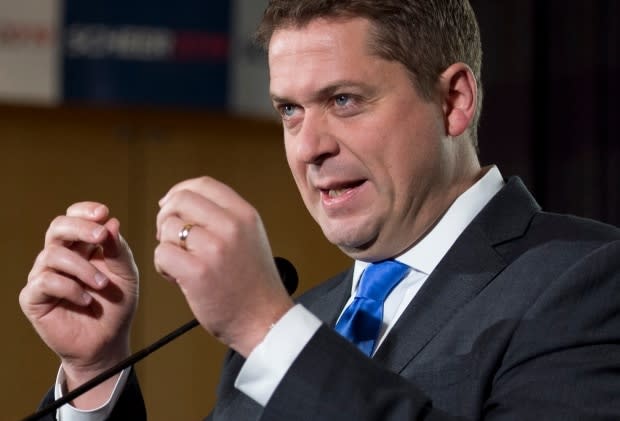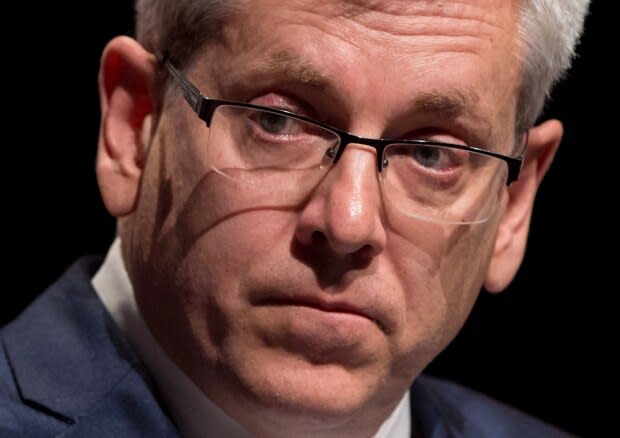Scheer says he would compensate First Nations children, families affected by on-reserve child welfare system
Conservative leader Andrew Scheer said Friday he supports compensating First Nations children and families who "suffered" under the on-reserve child welfare system.
During a morning campaign stop in Fredericton, Scheer was asked if, as prime minister, he would compensate First Nations children affected by the on-reserve child welfare system.
"I believe that children who have been mistreated or families that have suffered because of policies of the federal government should absolutely be compensated," said Scheer, to applause from his supporters.
Scheer also repeated his position that the September Canadian Human Rights Tribunal order — which said that Ottawa must compensate First Nations children affected by the on-reserve child welfare system — should undergo a judicial review.
Scheer's spokesman Daniel Schow said in an emailed response to follow-up questions that the Conservative party supports "the principles of reconciliation." His statement said that "those who have been mistreated by government deserve to be compensated by government."
Scheer's position on the issue is similar to that of Liberal Leader Justin Trudeau, who has promised to compensate First Nations children and families hurt by the on-reserve child welfare system.
On Oct. 4, the Trudeau government filed for a judicial review with the Federal Court of Canada challenging the human rights tribunal order. The Liberal government is also seeking a stay of the order. The Trudeau government also argued against compensation before the tribunal last spring.
Justice Canada lawyers said in the October court filings that the tribunal overreached by ordering Ottawa to compensate First Nations children apprehended from their homes and communities through the on-reserve child welfare system, along with some of their parents and grandparents.
NDP would push for public inquiry
Sony Perron, the associate deputy minister of Indigenous Services Canada, said in an affidavit that the order could cost the federal government up to $8 billion.
In 2016, the human rights tribunal found that Ottawa discriminated against First Nations children by underfunding on-reserve child welfare services.
In its Sept. 6 compensation ruling, the tribunal said that Ottawa prioritized financial considerations over the human rights of First Nations children.

The NDP and the Green Party both have said Ottawa should accept the compensation order.
First Nations leaders across the country criticized the Trudeau Liberals for challenging the tribunal order.
Incumbent NDP candidate Charlie Angus said his party would to take the issue further by calling for a national inquiry into the on-reserve child welfare system.
"Children are literally dying, day in and day out. Once they're disappeared into the system, they seem to disappear from even mattering," said Angus, who is running for reelection in the northern Ontario riding of Timmins-James Bay.
"That is why I think an inquiry is needed. We've had inquest after inquest, we've heard report after report, yet the issue remains prevalent in all the northern communities."
In Ontario alone, 102 Indigenous children and youths died between 2013 and 2017 within 12 months after they or their families received services from the child welfare system, according to public data compiled by Ontario's Office of the Chief Coroner through its annual pediatric death review committee reports.
The Aboriginal Peoples Television Network was the first to report on the data.

Mary Ellen Turpel-Lafond, the former child and youth advocate for British Columbia, said in an emailed statement to CBC News that the inquiry idea has merit.
"First, the impact on children of removal is such that their stories should be collected. Second, the deeper causes of harm need to be fully addressed," said Turpel-Lafond, currently the director of the Residential School History and Dialogue Centre at the University of British Columbia.
"Third, the issue of acceptance and support for those taken by the system is a major psychological issue related to trauma. In some cases, they are rejected by their own communities."
Cindy Blackstock, who heads the First Nations Child and Family Caring Society, said she believes the focus should remain on implementing the rulings and orders of the human rights tribunal.
"I think we have the answers needed," said Blackstock, who led the human rights complaint in 2007 that resulted in the tribunal's landmark 2016 ruling.
"What needs to be done is to have the recommendations and legal orders that are on the books implemented."


